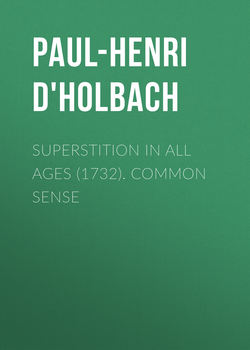Читать книгу Superstition In All Ages (1732). Common Sense - Paul-Henri d'Holbach - Страница 45
COMMON SENSE
XLII. – THE EXISTENCE OF MAN DOES NOT PROVE THAT OF GOD
ОглавлениеWhence comes man? What is his origin? Is he the result of the fortuitous meeting of atoms? Was the first man formed of the dust of the earth? I do not know! Man appears to me to be a production of nature like all others she embraces. I should be just as much embarrassed to tell you whence came the first stones, the first trees, the first elephants, the first ants, the first acorns, as to explain the origin of the human species. Recognize, we are told, the hand of God, of an infinitely intelligent and powerful workman, in a work so wonderful as the human machine. I would admit without question that the human machine appears to me surprising; but since man exists in nature, I do not believe it right to say that his formation is beyond the forces of nature. I will add, that I could conceive far less of the formation of the human machine, when to explain it to me they tell me that a pure spirit, who has neither eyes, nor feet, nor hands, nor head, nor lungs, nor mouth, nor breath, has made man by taking a little dust and blowing upon it. The savage inhabitants of Paraguay pretend to be descended from the moon, and appear to us as simpletons; the theologians of Europe pretend to be descended from a pure spirit. Is this pretension more sensible?
Man is intelligent, hence it is concluded that he must be the work of an intelligent being, and not of a nature devoid of intelligence. Although nothing is more rare than to see man use this intelligence, of which he appears so proud, I will admit that he is intelligent, that his necessities develop in him this faculty, that the society of other men contributes especially to cultivate it. But in the human machine and in the intelligence with which it is endowed, I see nothing that shows in a precise manner the infinite intelligence of the workman who has the honor of making it. I see that this admirable machine is subject to derangement; that at that time this wonderful intelligence is disordered, and sometimes totally disappears; from this I conclude that human intelligence depends upon a certain disposition of the material organs of the body, and that, because man is an intelligent being, it is not well to conclude that God must be an intelligent being, any more than because man is material, we are compelled to conclude that God is material. The intelligence of man no more proves the intelligence of God than the malice of men proves the malice of this God, of whom they pretend that man is the work. In whatever way theology is taken, God will always be a cause contradicted by its effects, or of whom it is impossible to judge by His works. We shall always see evil, imperfections, and follies resulting from a cause claimed to be full of goodness, of perfections, and of wisdom.
